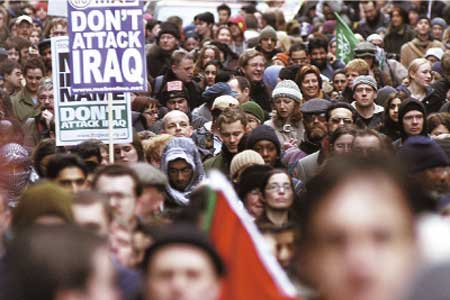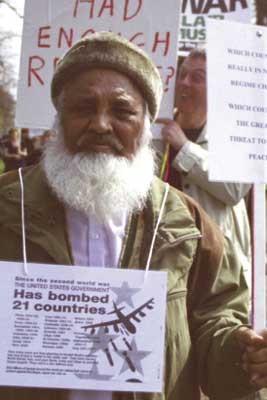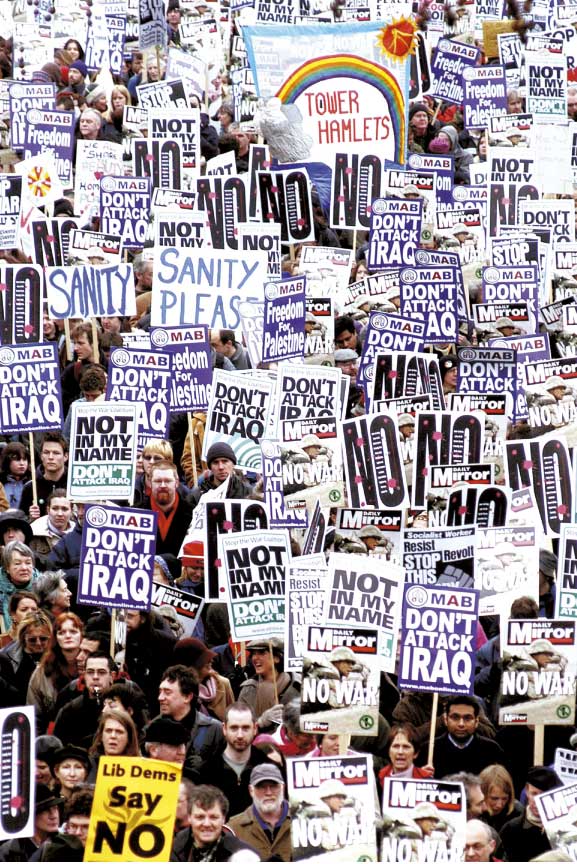
A Common Cause
Issue 1 Sept / Oct 2003
Global events of this century have propelled Muslim politics onto the front pages. James Abdulaziz Brown meets British Muslim activists who have joined in a common cause.
Make Tea, Not War exhorted one popular placard. If Muslims have shared nothing else with the rest of British society, it has always shared a love for the brown stuff. But during the stunning anti-war demonstration in February where that slogan was displayed showed there is now much more common ground than a simple cuppa.
Tens of thousands of Britain’s Muslims from all backgrounds stood alongside trade unionists and professionals, young and old, hardened campaigners and political novices, town dwellers and rural residents. The community marched in step with the significant majority of the country against war in Iraq.
Though it did not stop war in Iraq, this was an unprecedented achievement. Does it also present an opportunity to expand the role of Muslims in public life? Despite near-unanimity in opposing the war, there are a spectrum of views among British Muslims on how to approach such a task.
“All communities came together hand in hand to urge the government to stop the war,” said Inayat Bunglawala media spokesperson for the Muslim Council of Britain. “It did not work on this occasion but it demonstrated the power of the people, and roused people from their apathy. This is a good thing.”
“A lot of times people talk about discussion with the outside, but we need to have a discussion inside our community about what we are trying to achieve,” said Massoud Shadjareh, chairman of the Islamic Human Rights Commission, which in February organised a debate on ‘Islamic Perspectives on Engaging in Western Politics.’
Such a discussion goes right to the heart of the situation of Muslims living in Britain, asking whether Muslims can be citizens of the West without risking their Islamic values and aims. Not so according to Dr. Muhammad Al-Massari, a London-based Saudi dissident. He believes seeing the ‘will of people’ as the ultimate source of authority cannot be compatible with believing in Allah (S) as the Sole Legislator.
Some groups have highlighted the situation in the United States as demonstrative of potential problems with relying on traditional Western methods of political participation. Muslims there donated more money and turned out to vote in greater numbers than ever before during the 2000 presidential elections. Polls showed that the majority of them voted for George Bush, swayed in part by a campaign pledge to end the use of secret evidence and racial profiling against Arabs and South Asians by immigration and law-enforcement officials. With these powers actually extended by new anti-terrorism legislation and dozens of alleged Taliban fighters held without trial in Guantanamo Bay, the irony for American Muslims could not be more stark.

Any influence the community had in the White House, “was swept down the drain after September 11,” said Dr. Mohamed Al- Asi, an imam of the Islamic Center in Washington D.C. He argues that Muslims living as minorities in the West can only be swamped by traditional electoral politics.
British Muslims may see in Labour a betrayal parallel to that of their American counterparts by the Republican administration. Like most minority groups, they have traditionally voted Labour, but in the wake of the bombing of Afghanistan, and the war in Iraq, some are asking what the community’s electoral support has achieved. In Blackburn, for example, leaders of the Lancashire Council of Mosques met with local MP and Foreign Secretary Jack Straw in March to ask this question.
Despite such frustrations, the community should fight on to consolidate the organisation and mobilisation it has developed through the anti-war campaign, argues Dr. Azzam Tamimi of the Muslim Association of Britain, joint organisers of February’s march. “For us Muslims, this is just a beginning. This is a struggle for the long-term,” he said. “America is trying to redraw the world map. We are also very anxious that under concerns of national security and the threat of terrorism, our civil liberties and human rights are in danger.”
Muslim political participation, Tamimi believes, will be both right and – with continuing activism – effective. “It is not only permissible but mandatory if our participation can avert evil and bring benefit,” he said. “With the general political apathy, minority roles are magnified. If the minority is well organised, it can make a big difference. It all depends on whether the Muslims will be conscientious or not in this role.”
Inayat Bunglawala agrees, “Political participation is absolutely necessary. We arepart of this society. If we do not contribute and become an essential part f mainstreamsociety we are only defeating ourselves.”
Among the speakers at Hyde Park in February was Shahedah Vawda, a co-founder of JUSTPEACE, the Muslim wing of the Stop The War coalition. She stood on the windswept stage to address a crowd so large she could not even see where it ended.
“I was hesitant to be a representative. That scares me,” she admits. “But – I hope this doesn’t sound self-righteous – it is something I see as my duty. For too long Muslims have had a separatist mentality,” Vawda believes. “That’s not how I perceive my religion or my place in society. I see myself as an individual who is Muslim but who needs to act with whatever front is acting for peace or justice or truth.”

JUSTPEACE was formed by Muslims who in the weeks after September 11, 2001, attended the first Stop The War meetings, initially organised by the Socialist Workers’ Party. It was a surprising alliance, but one which has rapidly grown. “Traditionally, Muslims and the left have not been best buddies [but] al-hamdu lillah (praise be to God), it has been groundbreaking and through that partnership and that dialogue we have seen all sorts of networking and bridge building which we have never seen before,” Vawda said. From a small Muslim presence at initial meetings, there were soon enough to necessitate the breaking of the fast during Ramadan and prayer facilities for the November 18, 2001 protest in London. The call to prayer echoed across Trafalgar Square, rising above Nelson’s Column to loud applause from non-Muslims.
Such an inclusive approach is, Vawda believes, entirely Islamic. “If the Prophet Muhammad (s) did not have alliances with non-Muslims, we would not have Islam today,” she said. “He dedicated much of his life to building bridges with non-Muslims.”
Having arrived in this country from her native South Africa in 1997, Shahedah Vawda never saw herself as a natural leader in the British Muslim community. But in fact her experience in theanti-apartheid movement prepared her well for the pluralism of the anti-war campaign here. “I feel like all my amateur political years with ANC and the Islamic Society [in South Africa] was a preparation for this.”
In some aspects of working with non-Muslims – attitudes towards sexuality, for example, or proposed meetings in the pub – Vawda finds less room for compromise, but overall she sees confronting difficult problems at the heart of a living Islam. “It is part of the bigger dilemma any Muslim living in the West has. You have to be sure of yourself as a Muslim to engage [with non-Muslim groups],” she said. “You cannot have a Shaykh on tap 24 hours a day telling you, ‘This is right, this wrong.’ That is what Islam is about. You are given a framework and you have to work within it.” Fortunately, Vawda does not confront her unexpected role alone, far as she is from her family in South Africa. She met her husband at the second meeting of the Stop The War coalition in September 2001. Shahed Saleem put his hand up to suggest the Muslims present get together, and so began the birth of JUSTPEACE. They were married less than a year later.
“It has been very important to have the organised Muslim presence, not just for the numbers it has added but for the sense that this is a new movement, something dynamic and path-breaking,” said Chris Nineham, of the Stop The War coalition.
As pleasing as it is, he added, the Muslim presence is not surprising. Citing the growth of the anti-globalisation movement, Nineham sees Muslims as a natural constituency opposing unrestrained capitalism and neo-imperialism. “It was an alliance waiting to happen,” he said. “What we say in meetings is 95% the same most of the time. The perspectives and aims are not necessarily that different.” Now that this convergence has been catalysed by attacks on Muslim-majority countries, Nineham believes it can be a strong source of opposition in the longer term as the so called ‘war on terror’ expands.
“Despite the rhetorical victory in Iraq, the war in the broader sense is not going away,” he said. “We need to stay in the streets to protest against the military occupation there, to protest against any future attacks on Syria or Iran or wherever they start on next.”
At home in Britain, the interaction of Muslims and non-Muslims in the coalition has, according to Nineham, strengthened resistance to the scapegoating and racism implicitly encouraged by the government.
“The Stop The War coalition can be a source of opposition to establishment Islamophobia and the attacks on civil liberties,” he said. “When you have meetings at places like Burnley or Blackburn – targets for the BNP – attended by half whites, half Asians, that has to be a good thing. Once these bonds have been made, and you see young people of all religions and ethnicities out there marching together, it’s very hopeful for the future.”
words: James Abdulaziz Brown
images: Neil Palmer, Jamey Khan and Amran Afzal,
Bookmark this |
|
Add to DIGG |
|
Add to del.icio.us |
|
Stumble this |
|
Share on Facebook |
|
Share this |
|
Send to a Friend |
|
Link to this |
|
Printer Friendly |
|
Print in plain text |
|


Comments
0 Comments